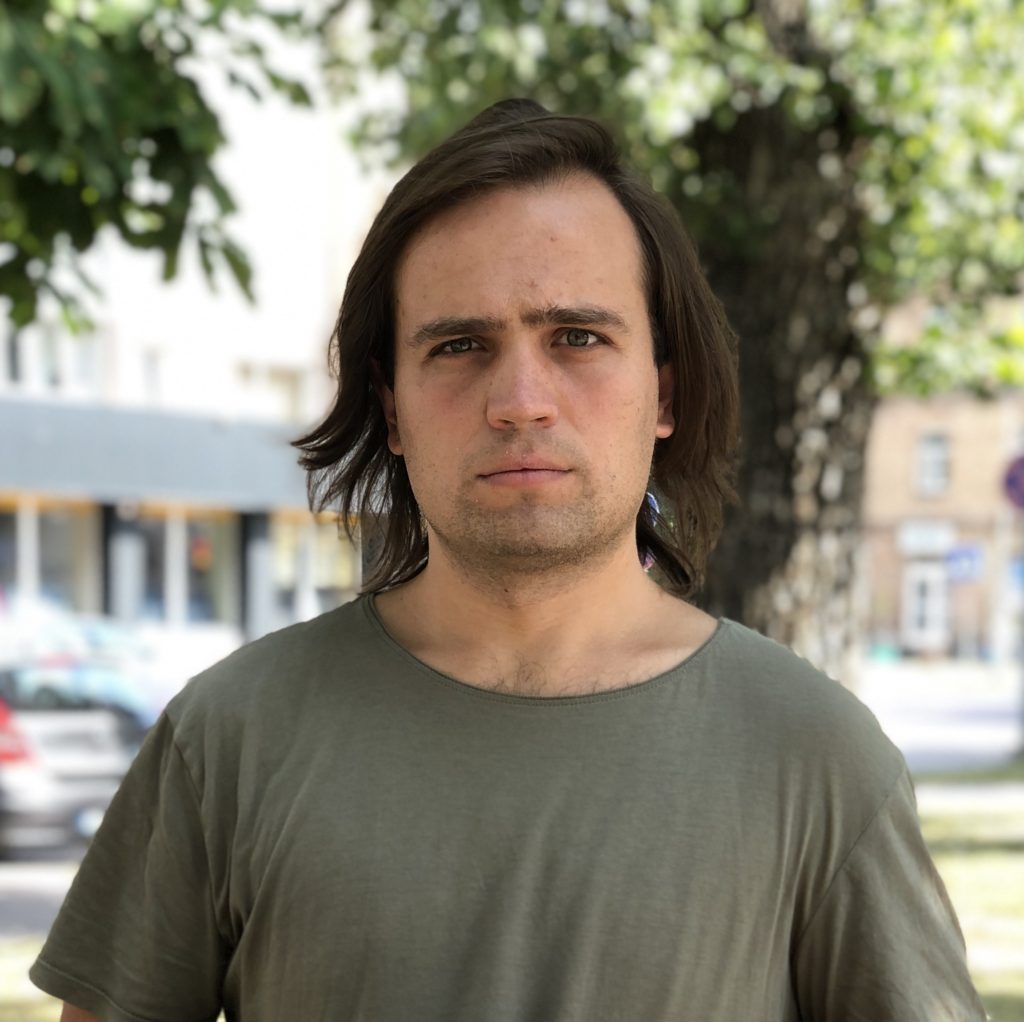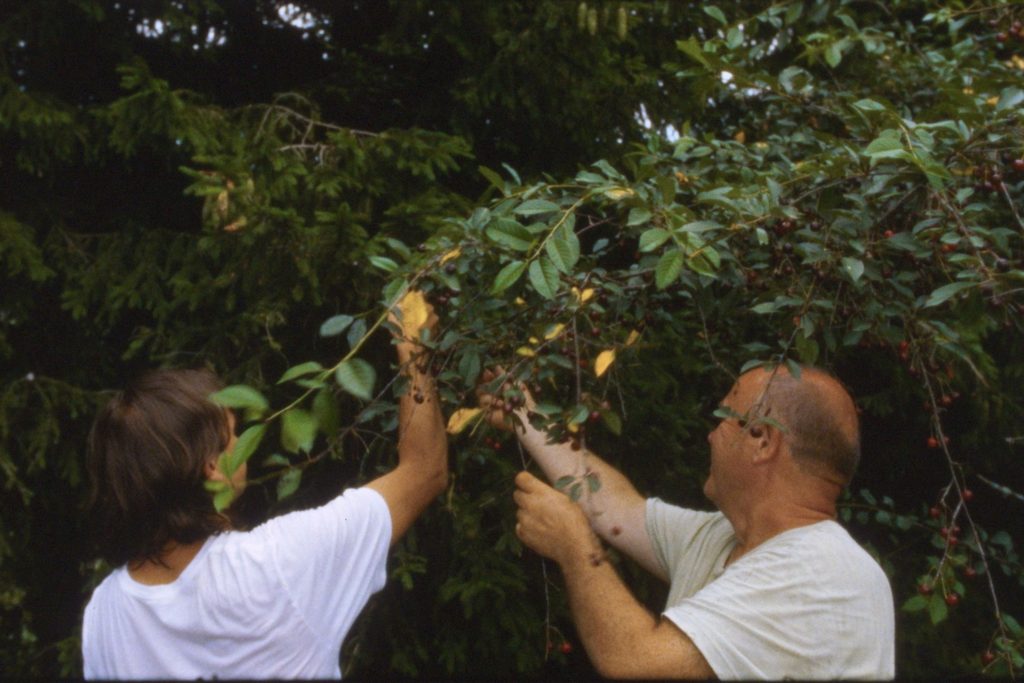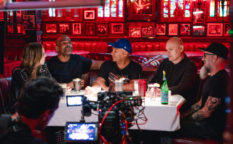Vytautas Katkus: I find it easier to express how I feel about certain things in images than when talking to people

Lithuanian director Vytautas Katkus is no stranger to Cannes. His first short film Community Gardens had its world premiere in Semaine de la Critique back in 2019, and with his third short Cherries, he is in the official Cannes Short Film Competition. Shot analogue, the film looks into the director’s relationship with his father through their annual cherry picking interaction that flows in an almost complete silence. It’s a physical, impressive film with a vintage feel, and a levitation scene, that stands out as one of the most memorable Cannes contenders.
We met Katkus on one of the Cannes’ beach clubs to talk about his recurring subject of a father-son relationship, about the power of good sound desing, and the significance of silence.
Your first short, Community Gardens had its world premiere in Semaine de la Critique here in Cannes in 2019, with Places you were competing in Orizzonti Corti (2020), and now you are back in Cannes, this time in the official short film competition. Selection committees obviously love your films.
I don’t know what it is. They certainly know more about why my films get selected. Not me. I just try to show them my movies, my feelings and emotions, which I feel that I somehow have to express. Very often, I find it easier to express how I feel about certain things in images than talking to people.
This is you second film about the father-son relationship, in this case more personal because it is about you and your own dad. What makes you take on this topic again, and explore it further?
First of all, when I made Community Gardens, I was interested in father-son relationships in general, as I was very curious about it. Somehow, I haven’t seen many movies about them. All I could remember were films about mothers and sons or fathers and daughters. I am certain that there are plenty of them, it’s just that I haven’t happened to see them, or if I have, they didn’t stay in my memory. In Community Gardens the story was more general, but in Cherries I was more curious about the generational differences and how a 30-year-old son and his father are looking at same things. This generational gap became essential. I also wanted to present a form of a coming-of-age story of both of us. In this movie, I was interested in a coming-of-age story of the son who is not that young anymore, and the father who is getting older and older. For him it is also a kind of shifting situation.
I guess that you shot the movie in your father’s house, or rather around it. Is the cherry picking your family tradition?
Yes. We are picking cherries once a year, and sometimes I am helping my father, but there are years when I can’t, so my mother jumps in instead. But I wanted to have one particular thing which connects us not emotionally but physically. I was thinking of few other films while developing the concept. Actually, to be frank, one could even claim that Cherries is boring because there is nothing happening, but on the other hand, it brings this closeness to the viewer. Father and son are doing something together in silence, and I personally find silence very interesting because when it becomes quiet, that always happens for a particular reason.
You can interpret the lack of conversation in so many ways. It is physical and personal. I am not talking only about my movie. Through films that inspired me I was examining how silence works, and that in most cases it can tell you more than a dialogue.

Why don’t we speak about those moments that are not silent? There is a recording of you as a kid telling your father sweet things, interrupted by certain songs. Can you explain that intervention?
For me music, particularly rap of the 1990s is very important. I listened to rap, and I have a lots of images in my head when I hear those songs. I kind of go back to my childhood, and try to remember how those years looked for me. I wanted to connect personal things with personal audio recordings, and at the same time to connect them with collective feelings from the past time.
Can you tell us something about your attraction to the analogue photography?
I am using analogue film for two reasons. One is very pragmatic, because the whole crew is much more focused on the film. They know how much it costs to make it, we don’t have a lot of takes and we have to do a lot of rehearsals. I like to do as much as possible in the production, during the filming and not in the post-production, not in the editing. I really wanted to have few good takes, and in this case I wanted everyone, including myself to be very concentrated. Analogue filming gives you concentration. The second reason is of visual nature. Analogue films look timeless. It doesn’t matter when they were shot, they have something dreamy about them. Right now, I don’t feel like making contemporary movies. This story could have happened 10-15 years ago, or just now.
Also, when I am trying to work with realistic stories, realistic shots, the analogue brings a kind of magical realism into the movie. But this thing is happening in real life and not in the digital one. So, yes, analogue is timeless.
How do you work with sound?
I have a sound designer who is a very good friend of mine – Julius Grigelionis. He is a young sound designer, and before we started shooting we talked a lot how we were going to work during the filming, and what to do in the post-production. We’ve spent a lot of time in the post-production, particularly with sound. We were looking for specific solutions. So, Julius and I worked super slow, trying to find a way to create a good atmosphere. Without sound, some images look very empty. The atmosphere is super important for me. Sometimes, it becomes more important than a dialogue. I don’t like hearing what people are saying. It doesn’t matter to me.
You usually work with the same people on your films.
Yes and no. In my first two movies, I was the cinematographer as well. In Cherries, the cinematographer was Simonas Glinskis, who is an old friend of mine. When I was a teenager, he used to teach me how to use the camera.
I am trying to work with the same crew, but that is not always possible because everybody is working on other projects, but the editor (Laurynas Bareisa), sound designer (Julius Grigelionis), and colourist (Justinas Vencius) are always the same. I am together with those three people all the time.
Sometimes I am afraid of new people on the set. Cherries is for me quite an intimate movie, and I wanted to have an intimate set as well which is why I tried to work with people that I knew from before.
How did your feel about the film, and your wish to explore your relationship?
I thought it would be worse. When the idea came, I knew that I would love to work with my father, but that this could be a bit risky. I even thought that I should maybe look for other actors. But then I realized that it is much better to have the real deal, because this was to be my most important film so far. I said to myself that if I were to work with the real father and son, it had to be us. So I decided to stay faithful to my original script. But then, when I aske my father about it, he refused flatly. He thought that he would have to play some kind of fictive character that required him to learn many lines, and he isn’t an actor. When I explained to him the concept, and offered a lot of rehearsals, but also the liberty to say whatever he wanted and be himself, he finally gave in.
He understood what the film was about. For him, the rehearsals were the hardest part, but they were also not easy for me. In the end, he was really happy to be the part of the project. On the set, he stopped being nervous, and he was like a completely dfferent person.
You are working on your first feature movie. Can you tell us a bit about it?
We are still working on the script. There are many changes to it. I am co-writing it with Marija Kavtaradze. She is also a director.
Shortly: it’s a story about a guy who is trying to connect with different places and people.
You are hopefully not giving up the short format!
Not at all. I just need new ideas.
















